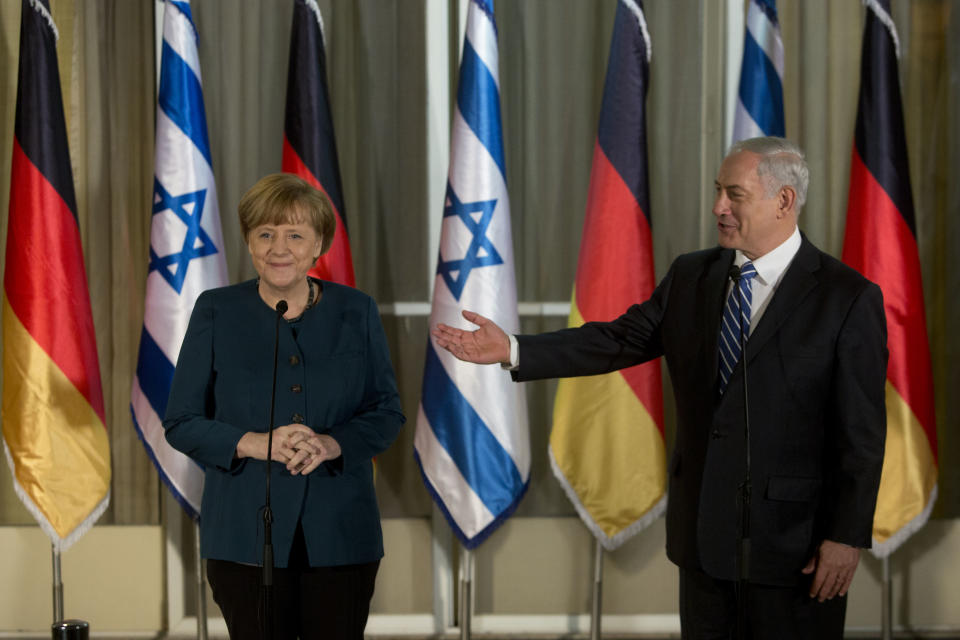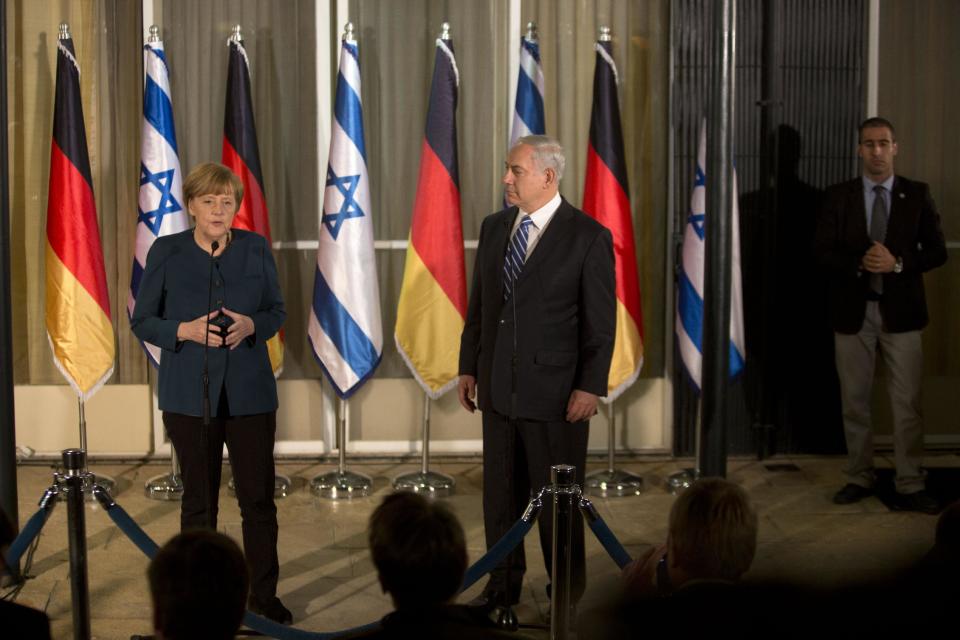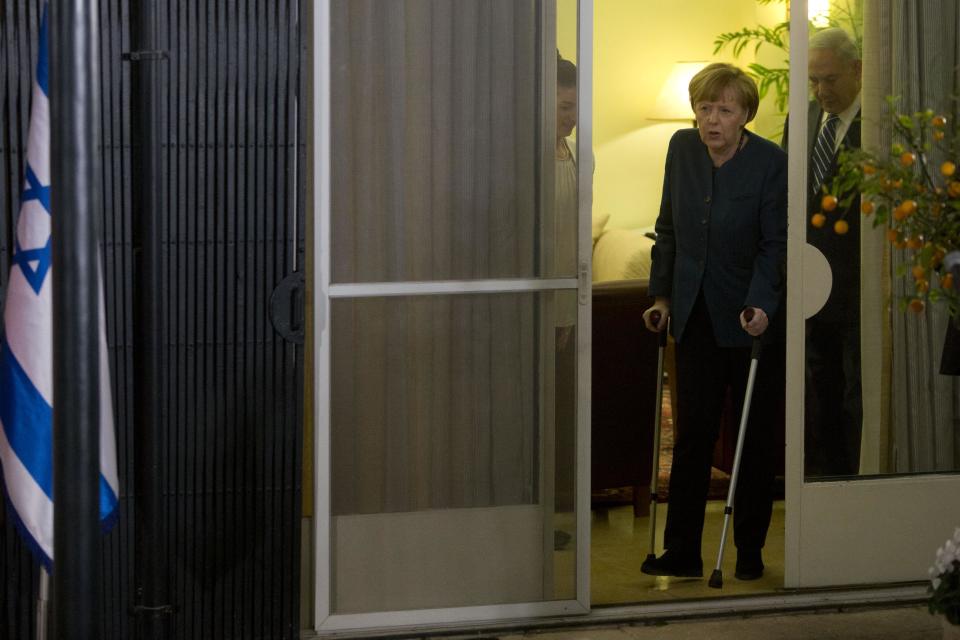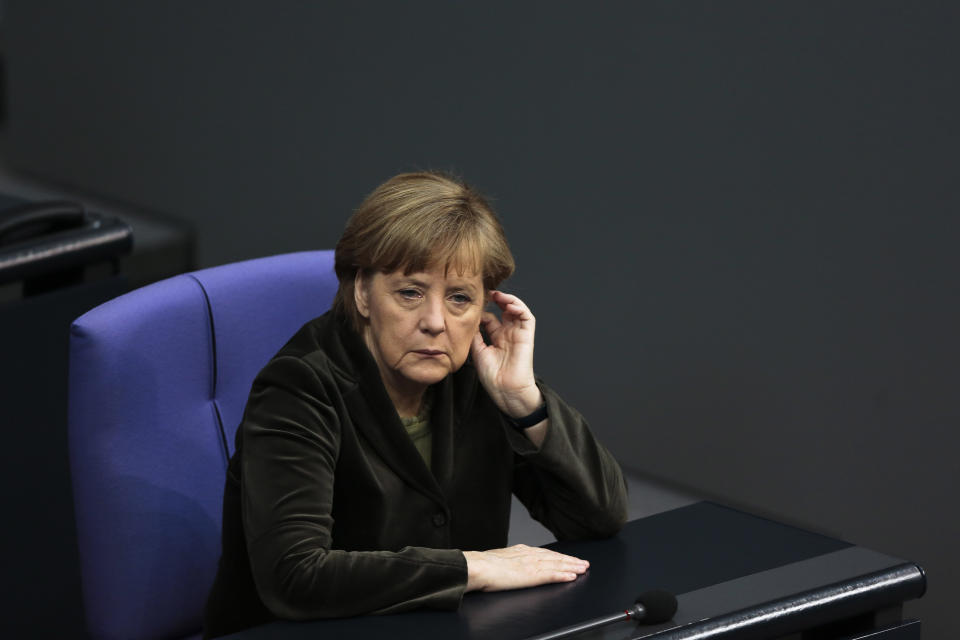German Chancellor Angela Merkel visits Israel
JERUSALEM (AP) — Chancellor Angela Merkel said Monday that she is visiting Israel with most of her new cabinet in order to show Germany's friendship with the Jewish state and that her country is working to secure the future of Israel.
Merkel was speaking at an evening press conference with Israeli Prime Minister Benjamin Netanyahu. Germany is Israel's closest European ally and holds an annual joint Cabinet session with its Israeli counterparts. Of late however, tensions with Europe, and also Germany, have risen over West Bank settlement policies.
"We have come here with almost the whole of our new government and we wanted to show you in this way that this is indeed a very strong friendship," Merkel said in German and relayed in English through a translator.
Merkel said Germany has been working with Israel "shoulder to shoulder" over the past five decades "to secure the future of the state of Israel." She said that "part and parcel of the security of Israel is the two state solution...a Jewish state of Israel and alongside it a Palestinian state."
Standing at her side Netanyahu said the U.S mediated peace talks, as well as international efforts to quell Iran's nuclear program, would figure prominently in his meetings with Merkel.
Germany also belongs to a group of nations currently negotiating with Iran, Israel's arch foe and a particular nemesis for Netanyahu.
"I would like to discuss ways to prevent Iran from getting nuclear weapons capability. I believe that this is the greatest challenge to the security of the world," Netanyahu said.
He also said he wanted to discuss ways to advance peace efforts with the Palestinians.
"The people of Israel want peace, they want a real peace, they want a peace that ends the conflict that finally gets the Palestinians to recognize the Jewish state and one in which we have the necessary means of security to defend ourselves against any possible contingency in this turbulent Middle East," Netanyahu said.
Germany's foreign minister heaped tough criticism on Israeli settlement policy in the West Bank ahead of the visit, calling the construction "disruptive" to peace efforts and saying it would be raised during two days of meetings with Israeli leaders.
Frank-Walter Steinmeier made the blunt remarks in Madrid before flying to Israel.
U.S.-mediated peace talks between Israel and the Palestinians will be a main focus in meetings, and German opposition to settlement construction will be raised, Steinmeier said in a statement.
"We'll discuss where things stand on the peace process and will try to find out what the obstacles are that prevent a solution," he said. "The settlement policy clearly remains among those obstacles and this will of course be raised. We said clearly in the past that we don't just consider decisions to expand settlements as unhelpful, but as disruptive of peace efforts, and of course we will discuss this during our visit," he said.
Israel says the fate of settlements should be resolved through the peace talks along with other core issues like security and Palestinian incitement. It has played down the importance of settlements, saying the issue should be resolved in the talks, and demands the Palestinians recognize Israel as the Jewish homeland. The Palestinians have objected, saying that would undermine the rights of Israeli Arabs as well as the fate of Palestinian refugees claiming lost properties in what is now Israel.
The annual joint Cabinet meetings highlight the strong bond between Israel and Germany seven decades after the Holocaust, when Nazi Germany killed 6 million Jews. The countries only established diplomatic relations in 1965, nearly two decades after the Holocaust. Germany is a key Israeli trade partner.
But tensions have been rising. Earlier this month lawmakers from a nationalist Israeli political party stormed out of parliament to object to comments by the visiting president of the European Parliament, who is German. Martin Schulz enraged the lawmakers when he asked whether claims he had heard from a young Palestinian about Israel's control over water resources were true.
Naftali Bennett, head of the Jewish Home party, demanded an apology. "I will not accept untruthful patronizing of the people of Israel in our parliament, certainly not in German," he said.
The figures cited by Schulz were indeed erroneous, but his general concern — that Israel consumes far more water than the Palestinians — was accurate, according to environmental groups.
Shortly before Merkel's arrival, Germany announced that her deputy, Sigmar Gabriel, an outspoken critic of Israel, was not participating.
Gabriel two years ago dubbed the conditions of Palestinians in the West Bank city of Hebron as "apartheid" — a term that Israel unequivocally rejects as false. Gabriel's office cited "illness" for the last-minute cancellation.








